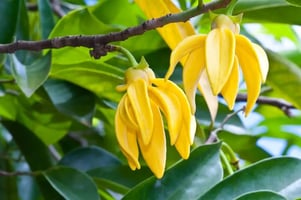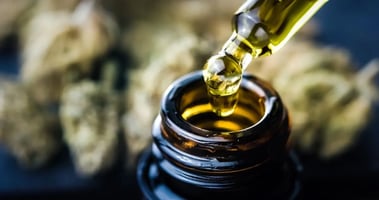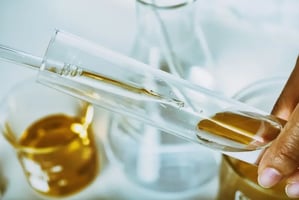July 19, 2023
Organic ylang-ylang: quality criteria for professionals
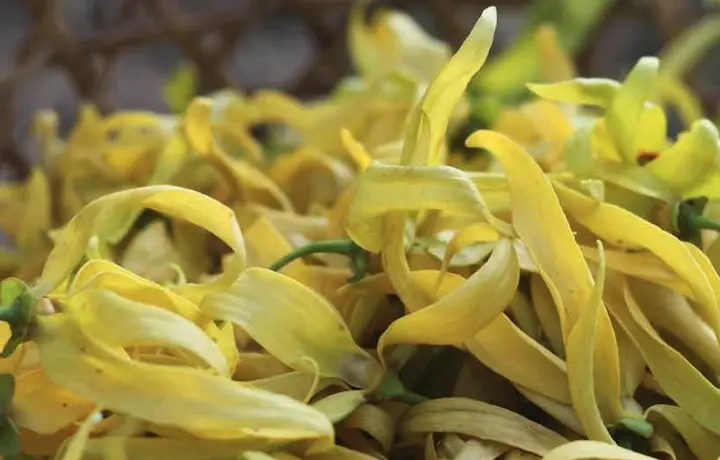
November 23, 2023
Ylang-Ylang: the organic choice for a sustainable future
Discover how Ylang-Ylang, the bewitching flower of the Indian Ocean, embodies the organic choice for a sustainable future. Learn more about its history, uses and Landema's commitment to eco-responsible production.
In the following article, you'll read about Biolandes and its organic and fair trade commitments. Landema is a 100% subsidiary of the Biolandes Group, and naturally shares the values of the company that created it.
Click here to find out more about our ecological commitment.
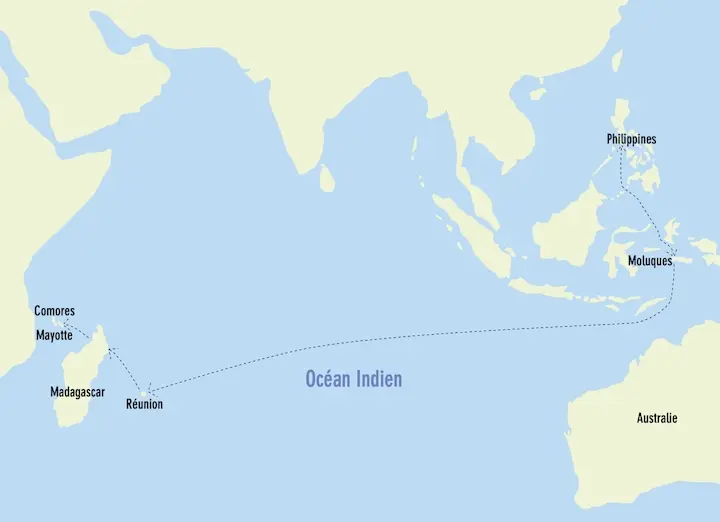
Landema - Biolandes Group
Ylang-Ylang, the flower of the Indian Ocean
Ylang-Ylang is more than just a flower; it's a symbol of sustainability and eco-responsibility. Discover how this tropical flower has become a staple of aromatherapy, perfumery and organic cosmetics.
Like many perfume plants, Ylang-Ylang is also a traveller.
Native to the Moluccan archipelago in eastern Indonesia, this tropical tree of the magnolia family blooms regularly all year round. The story goes that a German sailor, Albertus Schwenger, charmed by the bewitching fragrance of its flowers, set up the first Ylang-Ylang distillation unit in 1860 in the Manila region of the Philippines, giving birth to the essential oil trade. Production then moved to Réunion Island, where spice hunters had introduced the tree in the 18th century.
Today, it is found in northern Madagascar and the Comoros archipelago.
Ylang-Ylang: an olfactory and ecological journey across the Indian Ocean
Ylang-ylang's suave, floral notes make it a material reserved for feminine fragrances. The first to magnify it were Chanel N°5 (1921) and Bois des Iles (Chanel, 1926), followed later by Diorissimo (Dior, 1956). The many properties of its essential oil have led to its widespread use in cosmetics and aromatherapy.
The Ylang-Ylang industry is fragile, however, as it is all too often linked to irregular market demand, fluctuating product quality and access to water and wood resources for distillation.
Since 1997, Biolandes has been cultivating a Ylang-Ylang plantation in north-western Madagascar, where it distills the flowers harvested on the estate every day.
The 2014 takeover of a production plant in the Comoros completes the range and gives us a better understanding of the entire supply chain.
Find out more about the traceability of our plant extracts from field to bottle.
With this article, we invite you to discover this exceptional flower that men and women harvest every day in the Comoros and Madagascar.
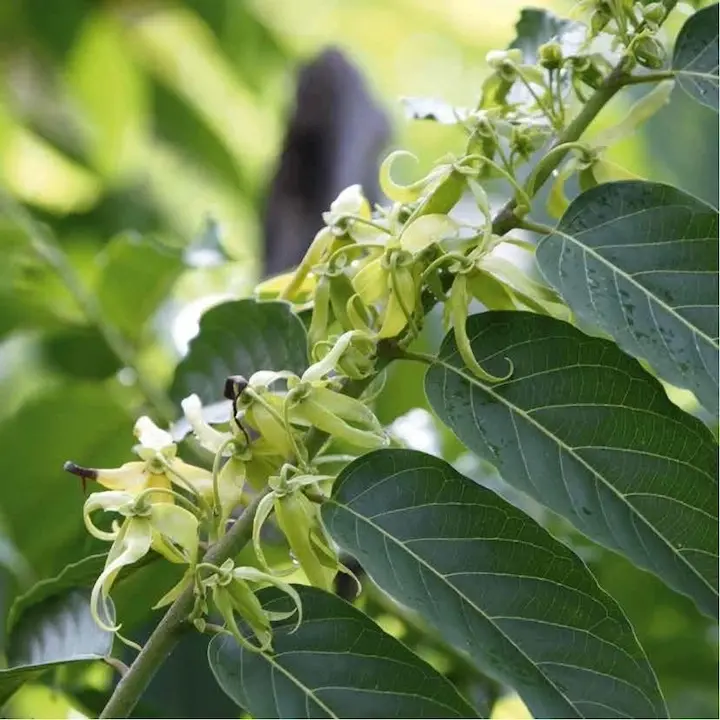
Ylang-Ylang in bloom © Landema - Groupe Biolandes
The "flower of flowers
Immerse yourself in the olfactory world of Ylang-Ylang, a multi-faceted essence.
Its scientific name, Cananga odorata, comes from the Malay name for the Kenonga or Kananga tree. Its Filipino name, alang ylang, evokes the "pendulous and mobile clusters" of its flowers in the wind.
Its petals give off a penetrating, spicy scent reminiscent of carnation, narcissus or jasmine. The "perfume of all perfumes" fills the air with a sweet, intoxicating fragrance for those who cross the plantations at sunset.
A long journey in the Indian Ocean
Follow the fascinating journey of Ylang-Ylang, from its tropical origins to its role in perfumery.
From the Philippines ...
From 1860 to 1950, Ylang-Ylang cultivation was concentrated in the Philippines, which enjoyed a veritable golden age for some fifty years. Sold under the name "Ylang-Ylang oil
par excellence", it became the benchmark for perfumes in Europe.
Today, there are still some large trees, but harvesting of the flower has disappeared.
... to new lands
At the end of the 18th century, during the era of the spice hunters, the first Ylang-Ylang plants arrived in Réunion from the Moluccas. However, the first essential oils were not produced until the early 20th century.
A flower that loves heat and humidity
The tropical heat of the Mozambique Channel makes this region ideal for growing Ylang-Ylang.
Trees are planted on the slopes of volcanoes in the Comoros and Nosy Be, or on the great alluvial plains of northern Madagascar.
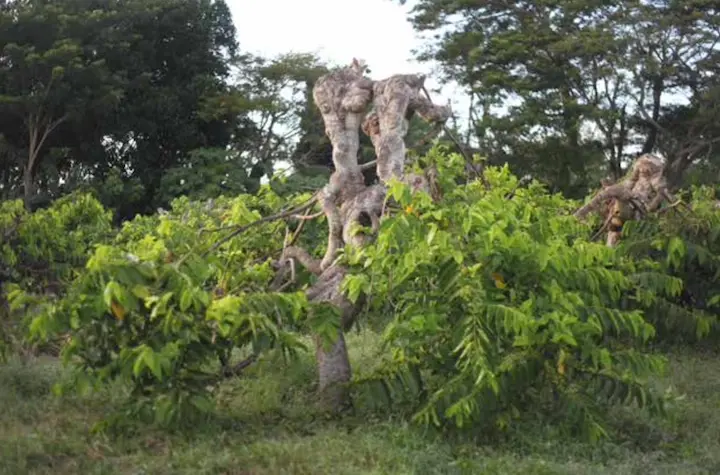
Ylang-Ylang tree in the Comoros © Landema - Groupe Biolandes
A tree that bends to man's will
In its natural habitat, the cananga tree can reach 30 m in height. Here, it is kept at man-height to facilitate flower-picking. Bending and pruning the branches, removing the seeds from the young shoots, these are the constraints faced by this giant, whose only desire is to reach for the sky!
Ylang-Ylang cultivation: a balance between tradition and eco-responsibility
Discover how Ylang-Ylang cultivation adapts to modern challenges while preserving its ancestral heritage.
In the Comoros and Nosy Be, hundreds of small plots of Ylang-Ylang are tended by farming families.
In the Ambanja region of Madagascar, a few large plantations inherited from colonial estates extend over several dozen hectares. History has thus shaped two agricultural models.
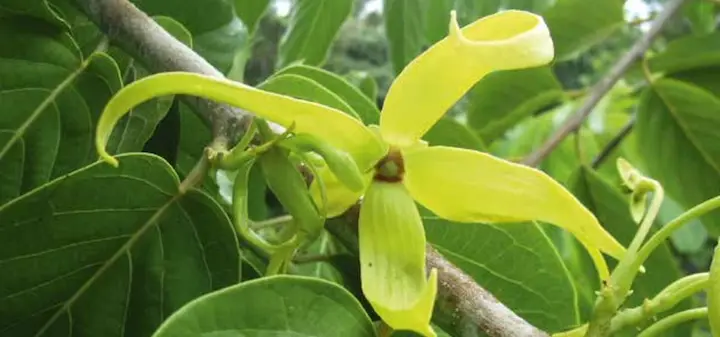
Ylang-Ylang flower in Madagascar © Landema - Groupe Biolandes
A year-round harvest
Ylang-ylang blooms all year round, with a marked abundance after the rainy season. The color of the petals varies from light green to deep yellow, with a carmine-red spot in the center, a sign to harvesters of a mature flower.
A generous tree
Ylang-Ylang produces flowers from the fifth year and for almost 50 years. One tree can easily provide up to twenty kilos of flowers a year...
Daily pickers
Discover the men and women who make the production of top-quality Ylang-Ylang essential oil possible.
Harvesting is a guarantee of daily income. After criss-crossing the plots for 3 hours, the pickers will have collected around 15 kilos of flowers.
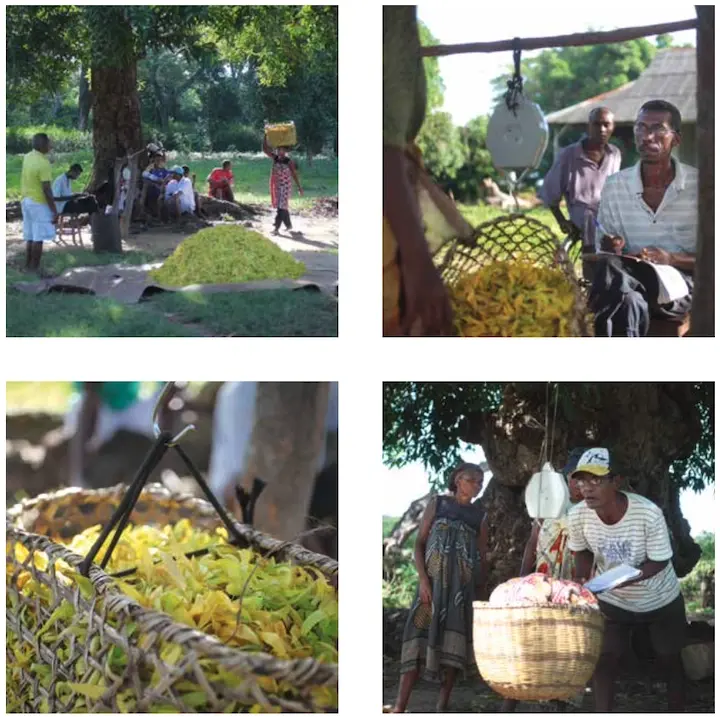
Weighing fresh Ylang-Ylang flowers © Landema - Groupe Biolandes
Weighing in the shade of the "cabar" tree*.
The weighing ritual is a key moment in the sustainable, artisanal production of Ylang-Ylang.
The pickers converge on the scales to weigh the flowers as a reward for their hard work. It's a time for resting, meeting new people and chatting.
*From the Malagasy "kabaris": exchanges, palavers...
Immediate distillation: a necessity to guarantee quality
Discover why rapid distillation is crucial to preserving the quality of Ylang-Ylang essential oil.
Because the flowers are fragile, distillation takes place immediately after collection, close to the plantations. The stills are already smoking, waiting for the fresh flowers.
The fragility of Ylang-Ylang flowers requires immediate distillation to preserve the volatile compounds.
The exceptional yield of Ylang-Ylang
Discover the distillation process that makes Ylang-Ylang one of the most precious essential oils in perfumery and aromatherapy.
Ylang-ylang is an essential oil goldmine. Whereas it takes around 4,000 kg of rose petals to produce one kilo of essential oil, only 40 to 50 kg of Ylang-Ylang flowers are needed. This represents an 80-fold increase in yield, making it a valuable resource for the perfume, aromatherapy and cosmetics industries.
The science behind fractional distillation of Ylang-Ylang
Understand the nuances between the different fractions of Ylang-Ylang essential oil and their importance in perfumery, organic cosmetics and aromatherapy.
Ylang-Ylang distillation is a delicate process lasting around 24 hours, during which the essential oil flows continuously through the essencier. Thanks to the fractional distillation technique, the essential oil is recovered in four successive fractions: Extra, First, Second and Third.
Each fraction has a different density and chemical composition, enabling the isolation of specific compounds such as esters and terpenes.
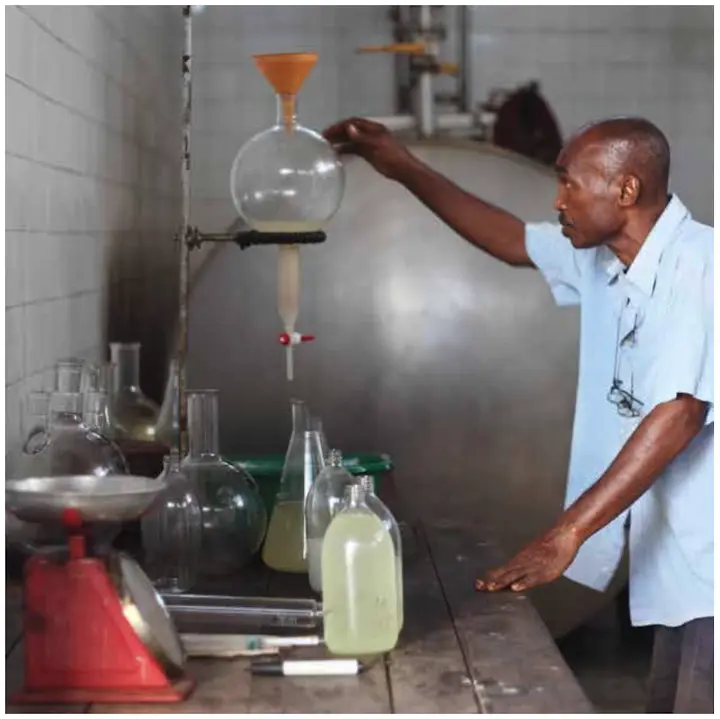
Ylang-ylang distillation in the Comoros © Landema - Groupe Biolandes
Ylang-Ylang essential oil fractions for specific uses-
Discover how each fraction of Ylang-Ylang essential oil has its place in perfumery, organic cosmetics and aromatherapy.
The different fractions of Ylang-Ylang have specific applications. Extra" and "Première" fractions, rich in esters, are often used in luxury perfumes.
The "Second" and "Third" fractions are ideal for cosmetics and functional perfumery, with a higher concentration of compounds such as linalool.
The "Complete", a blend of all fractions, is particularly prized in aromatherapy for its therapeutic properties.
Learn more about the properties of Ylang-Ylang essential oil in this other article.
A sensual essence
Ylang-Ylang's sensual scent makes it an essential oil that appeals to the most discerning noses.
One of the sweetest and most sensual scents in perfumery, Ylang-Ylang essence is powerful, floral, spicy, camphorated and slightly fruity. What's more, its profile differs according to its origin: Ylang-Ylang from the Comoros is very floral and heady, with a hint of smoke, while Ylang-Ylang from Madagascar is more ethereal and sunny.
Supporting artisanal distillation
The quality of the essences produced depends on mastery of all distillation parameters. Supporting this artisanal production, in small "bush" stills, means supporting all these Ylang-Ylang craftsmen.
Landema and Biolandes are committed to producing essential oils that respect the environment and, wherever possible, are certified fair trade.
Find out more about our ecological commitmenthere.
Empowering the industry
Discover the challenges and solutions for making Ylang-Ylang essential oil production more sustainable and eco-responsible.
Multiple distillations make this a wood-intensive species. Preserving this resource means ensuring the long-term future of Ylang-Ylang production.
Reducing wood consumption in stills and encouraging the planting of fast-growing forest species are just some of the ways in which we can support this production.
Biolandes in Madagascar: growing organic Ylang-Ylang
Located on the plains of the Sambirano river in Ambanja, in the middle of its plantation, the Biolandes farm has chosen to produce an original fraction of Ylang-Ylang, VOP (Volatile Oil Parts). This nectar, collected during the first hours of distillation, adds a modern facet to the traditional qualities of Madagascan ylang-ylang.
Biolandes' choice in the Comoros: distillation in Anjouan
By acquiring the last factory in operation on the island of Anjouan, Biolandes completes its offer with Ylang-Ylang qualities from the Comoros. Thanks to a well-established network of small farmers, the plant produces the fraction known as Extra Supérieure.
The rare, precious scent exhaled by the flower in the early heat of the day is the hallmark of prestigious perfumes...
Securing the future of the industry
Thanks to its total integration in Madagascar and its presence in the Comoros, Biolandes is committed to ensuring that the men and women who work every day to produce this essence can pass on their skills to future generations.
Yields and products
Dive into the data showing the global impact of Ylang-Ylang in the perfumery, organic cosmetics and aromatherapy industries.
Production areas
Indian Ocean (some isolated production in West Africa)
Union of Comoros: Grande Comore, Anjouan, Mohéli
Mayotte (Overseas Department)
Madagascar (Ambanja on Grande Terre and Nosy Be).
Yields and products
100 kg of flowers yield around 2 kg of essence.
Annual worldwide production of around 60 tons of essential oil.
Use
Perfume: provides a powerful, spicy floral note.
Aromatherapy: used for its sedative, antiseptic and aphrodisiac virtues... Its many benefits can be explained by its extremely complex biochemistry.
You can find more examples in this article.
Flavours: for flavouring ice creams, sweets, drinks...
Biolandes
A unique plantation and 2 processing sites:
- A total of 270 ha of Ylang-Ylang plantations
- An organic farm and distillery in Ambanja, Madagascar
- A distillery in Domoni, Anjouan.
15 kg of flowers harvested per picker every day.
An average of 200 pickers per day throughout the year.
Over 200,000 kg of flowers harvested per year.
Landema
Landema, a subsidiary of the family-owned Biolandes group, specializes in the online sale of professional-quality natural extracts, the result of 40 years of know-how direct from the producer.
Find Ylang-Ylang(Cananga odorata) essential oil in 3 variants, each available in formats ranging from 1 ml to 5 kg:
- FFL-certified organic whole essential oil from Madagascar,
- Comoros complete essential oil,
- Comoros extra essential oil.
And to explore our full range of plant extracts, visit our online store.
Source: book "L'Ylang-Ylang de Madagascar aux Comores" published by Biolandes in March 2015

